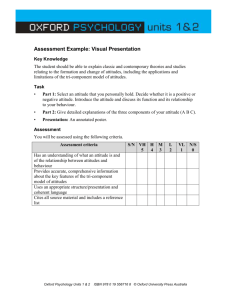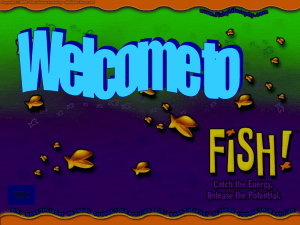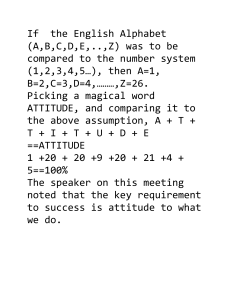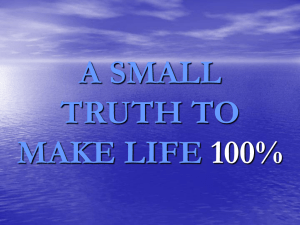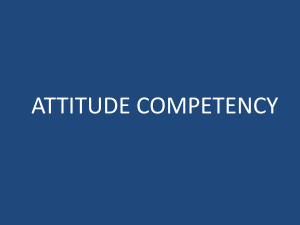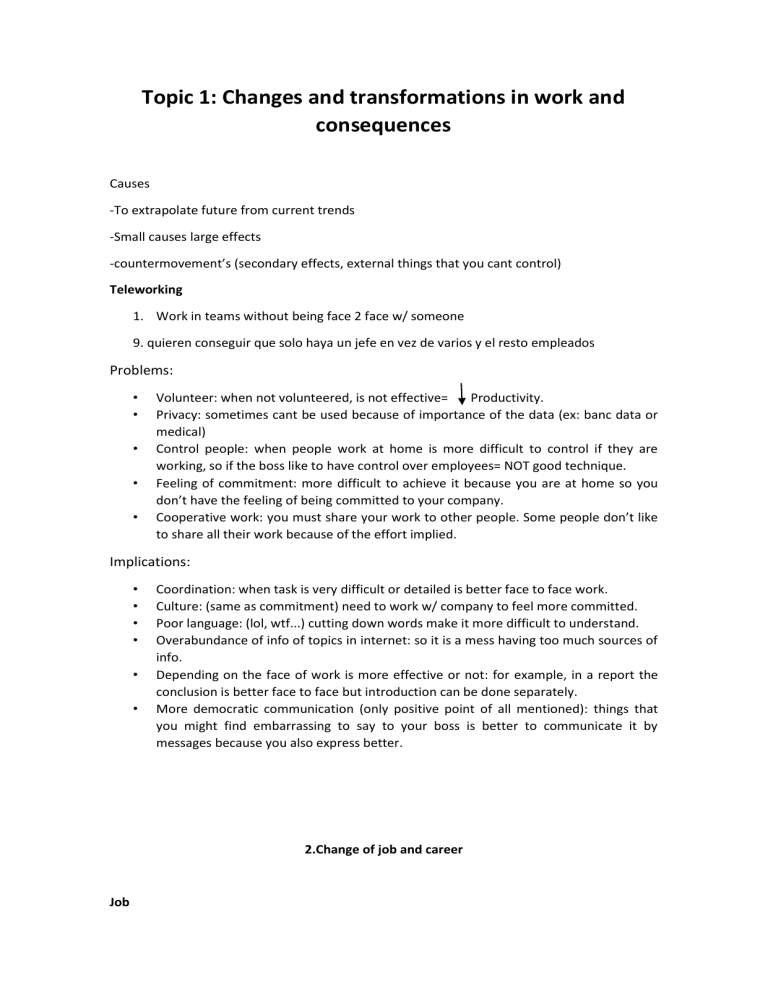
Topic 1: Changes and transformations in work and consequences Causes -To extrapolate future from current trends -Small causes large effects -countermovement’s (secondary effects, external things that you cant control) Teleworking 1. Work in teams without being face 2 face w/ someone 9. quieren conseguir que solo haya un jefe en vez de varios y el resto empleados Problems: • • • • • Volunteer: when not volunteered, is not effective= Productivity. Privacy: sometimes cant be used because of importance of the data (ex: banc data or medical) Control people: when people work at home is more difficult to control if they are working, so if the boss like to have control over employees= NOT good technique. Feeling of commitment: more difficult to achieve it because you are at home so you don’t have the feeling of being committed to your company. Cooperative work: you must share your work to other people. Some people don’t like to share all their work because of the effort implied. Implications: • • • • • • Coordination: when task is very difficult or detailed is better face to face work. Culture: (same as commitment) need to work w/ company to feel more committed. Poor language: (lol, wtf...) cutting down words make it more difficult to understand. Overabundance of info of topics in internet: so it is a mess having too much sources of info. Depending on the face of work is more effective or not: for example, in a report the conclusion is better face to face but introduction can be done separately. More democratic communication (only positive point of all mentioned): things that you might find embarrassing to say to your boss is better to communicate it by messages because you also express better. 2.Change of job and career Job - - Reduction of jobs in production and services: due to reengineering (to study movements of a company, register what employees are doing and taking notes of their processes, what time they spend to do some processes. Then they collect info and cut processes to reduce time, and this might get away of employees to save money and time. Usually done by new engineers ) Reduction of personnel: due to technological innovation Temporally work increase: you are not going to be in the same company all your life. Project work increase: when the project finishes, the employees go off the company. Employability: you must attract companies. You need to be updated. Commitment: if you now that maybe the next year you are not in the same company make u be less committed to the company. Entrepreneurial spirit: being old Think of market all the time: you must now which companies are growing, where are the better jobs, which companies are offering jobs. You do this by reading economic newspapers… Career -Life time: your age -Private life: you want to have time for your life. In the future is going to be very difficult to separate private life with your company. If you have a project with begging and end you will not have much time to spend on your private life. Also depending on your job position with lot of responsibility, you should be all the time online. 3.Faster rate of innovation There are 2 types of innovation: 1. Creative - Means that you are able propose new thing, original ideas. 2. Initiative - To execute the ideas. - With the future will increase Innovation of process vs innovation of product: one thing is the product and the other is the process of the product. Learn faster: general skills, self-regulation (identify our problems, in personal and working areas), self-training (lean from errors), learning organizations culture: curiosity vs. uncertainty avoidance. 4.Increase of complexity of work In the future we will find more demanding intellectual work; me more smart, intelligent, to make decisions, solve problems… Causes of demanding intellectual work: - - If you are accompany and want to survive you need to find your place in the market (being the unique one). SMALL NICHES. Ex: prenatal for babies. To arrive to this position you need to use your intellect. Customization: being able to personalise a product. Customer orientation: to know if customers are satisfied. To now necessities of customers. Implications: 1. What can be done for unskilled works? Play with the wage (salary): getting people without a talent and pay less. Governments also can give to the companies 2. What can be done for not socially competent people? Training when introversion is a problem 3. Self-esteem and self-efficacy 4. Job analysis of intellectual work 5.Personla initiative vs. adaptivity to new work 6.Global competition Means that everybody is competing with everybody around the world. Competition is not good for our health. Implication: 1. Develop good and original ideas, productivity and positive attitude (to show you are happy). 2. More imaginative companies: self-reliance (to be able to work in an antonymous way), initiative (do things in different ways) and involvement (of employees on the company). 3. More turbulence environment: so, companies need to be flexible, being able to adapt to new situations. 4. Cross-cultural management: when doing selection processes 5. What to do with smaller companies to survive? Being the best in your town, so people in the city go to you and not to multinationals. This can be done by being more personal/familiar and create emotions on customers. 6. Reduction of the power of the labor unions (sindicatos): need to be more flexible with norms, procedures… 7.Development of larger and smaller units Contingency theory: you need to by many things to decrease price. But if you find climate change important and customers is better small companies 8.More teamwork Recommendation of work on teams: 1. Job rotation: you must know the type of activities that the rest of people is doing in your company. So, companies make employees spend some time with each member, so if someone get sick, the employees will be able to substitute them. 2. Self-coordination: reduce supervisors. If organization is horizontal, they need to organize themselves, without supervisors. 3. Interdisciplinary work: register. You must adapt the way you talk to the rest of the people, so everyone understands you. Register: members of the group/audience. 4. Social and communication skills: emotional intelligence. To be nice: have social skills, applying emotional intelligence. 5. Team training, team development measures, integration: manager should pay courses for team training. Ex: convivencias (autour training). Measure/evaluate performance of teamwork. Integration quickly and provoke a good first impression. Is better working individually or in teams? Depending on the task, it will be better on thing or the other. 9.Reduce supervisors Question that will be solved on the future: Who is going to transmit organizational knowledge, culture and socialization? Who is going to control errors? Someone in a upper position than an employee will do it. Who is going to facilitate changes? An assistant will do this things nowadays. 10.increase of cultural diversity The future: working with people from different countries, cultures… . This will create: - Prejudice and animosities To avoid prejudice and animosities there are two approaches: 1. Categorization: focus on difference between you and the other person in culture terms. 2. Elaboration: find the best of every culture. - Language : at least you should speak English. 3 changes in work world focused on us (European point of view): Since USA is more advance, we can predict the future errors and problems that we will face. - Succession planning: crisis of leaders They want to find talented employees, for future leaders of important companies. - Generation X (1965-1980) vs generation Y (born after 1980). Companies have both generations, generation X had better positions because of years of experience, for them the fist thing is the work, and Y are the employees. They want to work to get money for free time, so for them the work is no the important thing. So, because of this differences, there are sometimes problems when working together. Topic 2: Attitudes and values towards work 1. Attitudes and behaviours: Attitudes influence: people’s behaviour and performance at work. Changing attitudes is one of the most different things in psychology. 2. What is an attitude? “evaluative statements or beliefs about something or someone” So, you always have a target “individual predisposition to act in positive or negative way in front of a target, and this target could be a person, a situation (politics) or object (technology)” – definicion de la profesora. Components: 1. Cognitive: type of thoughts ideas /opinion, that come to my mind when I see the target. Positive or negative ideas. 2. Affective: emotions, feeling that I have in front of the target. 3. Behavioural: type of reaction/ response in front of the target. Most important component on psychology? Behavioural, because is the only component you can observe, evaluate, and control yourself behaviour. Attitude : Individual predisposition to act in a positive or a negative way in front of a target (person, situation or a thing). Cognitive, affective and behavioral Cognitive dissonance theory : behavior must be consistent with your attitudes in order to avoid dissonance or alter attitudes as a consequence os behavior. The theory of planned behavior … Activity Newlywed 2 Husband 6 Lover 3 Madman 1 Boatman 5 Friend 4 Work-related attitudes Job satisfaction : person’s general feeling about their job, the extent to which they feel positive or negative. Things that determine my job satisfaction : personality, dispositions, job characteristics, distribute justice (the salary compared with you colleague). Organizational commitment : The extent to which an individual feels they have a positive relationship with they organization. Affective - I like my company and I have a feeling of commitment with my company because I like the philosophy. Influenced by organizational characteristics, work experience, personality Continuance - I continue working in my company because I don’t have alternatives outside even though I am not comfortable. Influenced by alternatives (company offers to you things for the future) Normative - Moral issue, you behave well with the company because you are like in debt, you continue for an ethical question, you feel the need to be loyal. Influenced by socialization. Consequences of commitment and satisfaction Depending on the situation job performance is influenced by satisfaction and commitment. Commitment and satisfaction influence on withdrawal (absence, lateness and turnover) or counterproductive behavior. Organizations are influenced also - more costumer satisfaction, higher profit, more productive, lower turnover, fewer accidents.* Other work attitudes Employee engagement : the extent to which people are enthusiastic about and actively involved with their job and organizations - provoke the same results as before* Job involvement : how invested a person feels in their job in an organization. Justice and fairness 4. Attitude change: persuasion and influence 2 theories of changing attitudes: 1. Elaboration likelihood model (ELM): change attitude by yourself. 2. Heuristic/systematic model (HSM): Power, credibility and attractiveness, which persuades you to change attitude. Ex: famous people doing a commercial. Attitude strength: if you have a strong attitude toward something, it will be difficult to change it and vice versa. If you have a strong attitude towards something and you change you attitude and then you come back with the previous attitude, it is more difficult to change it a second time. Fear: when someone changes you attitude due to fear you. 6. Wider influences on behaviour at work - Emotions and behaviour work environment influence emotions. Good job: good emotions. Which influences on: Job event: you think about the idea of you day (+ or - moments). Which influences: Experiences emotions: positive moments= positive emotions and vs. which influences: Affect-driven behaviour: impulsive act, spontaneous helping (when you are happy you facilitate job of others). Personal disposition: trust affect (personality), emotional estability. Which influences: Work attitudes Judgement-driver behaviours: if you wan to leave company - Perception and behaviour Perception: way you interpret environment/ situations. Something subjective. Represented as: Stimuli Process Behaviour Input Process Output In process= perception . in front of same stimulus, which influences things such as emotions, personality, attitude… which will influence the behaviour. Attribution theory: Interpersonal perception shortcuts (perception that you have other things) (contaminate our perception): - - Selective attention (concentrate just on X stimuli)- cocktail-party-theory Stereotyping Halo effect: first impression (should be positive) interpret things depending on first impression. Depending on the first impression a person will attribute you attitude in a positive way or negative. Contrast effect: when you are interviewing someone, and all are bad except one , that one is like fantastic, when in reality he might be normal. Similar-to-me effect: when someone has something in common with you so you feel more “attracted” with that person. Personal construct theory: process we follow when we perceive people. When we are interacting with some one we apply that shortcuts. Attribution theories: the causes of our behaviour about success and fail. Normally when you do a thing good, you do internal attributions and when is a fail something you attribute it to external factors. Is it reasonable to say that no human decision is ever really completely rational? Bounded rationality theory Limitations: - Introduction of risk and uncertainty: loss aversion. We take risks when we are uncertain of something. Incomplete information about alternatives. If we don’t have data to analyse we can make a rational decision Complexity. Many variables and circumstances that you cant control to make a decision. So if we cant make a clear decision: Intuition: When is intuitive decision-making more effective? 1. Decision makers have developed deep knowledge of the context of problems and the domain areas that frame problems. When you are an expert on a situation, you can believe on you. 2. Problems and the task associated with them are judgemental rather than intellectual The shopping story True 6 7 5 Social influences on behaviour Social facilitation: your performance is better when others are present or observing. Drive theory: presence of others can serve to inhibit as well as to promote behaviour Explanations 1. Evaluation apprehension. We don’t like negative feedback of ourselves from others 2. Distracion-conflic theory. Eliminate any kind of distractions Social loafing: when we are doing a job in groups, people tend to not give the best of themselves. Personal identity: idiosyncratic traits and individual differences that give you a sense of who you are. Social identity: way in which you perceive yourself as a result of being a member of a particular social group. Depersonalization (negative) : when you eliminate your personal identity and you only have social identity. If others perceive your group negatively? you tend to go out of the group or reinforce it by integrating more. Conformity: - Asch experiment - 2 levels of distortions of judgement 1. Distortion of perception: when you see that the persons of the group have same answer, and you another answer, you tend to change answer because you think are wrong. 2. Distortion of response: accept answer of others, so you avoid conflict but internally you think that are wrong. - When was conformity reduced? When you can answer anonymously, when you find another person of the group that think the same as you. Obedience to authority: -Milgram experiment -Would regular people in the general population obey authority if instructed to cause harm to others? -What are the implications for organization? -Cross-cultural perspective: need to take into account when you are management of a international companies with lots of cultures. Culture influences if you are obedient or not. Unit 3: Motivation, job satisfaction and performance What is motivation? Cause/ impulse you feel to do activities in order to achieve your goals. What is work motivation? Impulse to develop activities in order to achieve goals at work. Abilities, training and motivation 1.Why do some individuals show high motivation in their job while other do not?- first part of chapter Content-related theories of work motivation In this theorys cause of motivation: - Individual needs Situational characteristics (nice job or not) Interaction between individual needs and situational characteristics 1.Individual needs -McClelland - genetic base When you are born, you have this necessity: 1. Need of achievement (you like to get results, achieve, benefit, obtain, compare with others) so you like more risky jobs. 2. Need of affiliation (like interaction with people). 3. Need for power (like to influence on the others behaviour, like to now what others do, like to convince people). Being a manager is the best job. One of the 3 necessities are dominant on every of us. To measure this needs: Thematic Apperception Test, Murray (1938) Task: Maslow pyramid – hierarchy of needs 1. 2. 3. 4. 5. Self-actualization Esteem (admiration) Love/belonging Safety (home, money) Physiological Steps are related, when something changes on a step, the rest also changes. Depending on style of life, Maslow can be used. Ex; Africa poeple Maslow´s problems: - Self-actualization Hierarchical order (try to satisfy all at the same time: is not hierarchical) – no order Logical and clinical insights (no empirical evidence) Maslow’s Problems: Self-actualization: it is a broadest concept that is not specific, it is important to clarify this concept in the future Hierarchical order. Normally you try ti satisfy all the necessities at the same time, so the hierarchical order is not clear. Logical and clinical insights: the theory is something logical, without number or empirical evidence. If suddenly you lose safety, for example (losing your job), I will go down through the pyramid, the rest of the steps will be modified because something changed on one step. For trying to build up the pyramid again. You cannot apply Maslow’s pyramid in any country, there may be countries such as Africa where their own need is eating, drinking and being healthy, reaching only to the first or second step. Characteristics of the work environment 1. Herzberg’s two-factor theory (1966): Herzberg is the father of the distinction between intrinsic and extrinsic motivation. Job enlargement: I’m going to give more things to do to people with low levels of motivation in order to avoid monotony. This is worse as it can lead to work overload. Job enrichment: I’m going to give more responsibilities/autonomy to the employee who isn’t motivated. 2. Job Characteristic Model (JCM). Hackman and Oldham (1976) According to this model we have 5 core job dimensions that influence on psychological state and the personal and work outcomes. 1. Skill variety 2. Task identity: if I’m able to control the task. I participate from the start to the end of the task. 3. Task significance: for being a university teacher, you are the future, teaching the future employees. An important job for society. 4. Autonomy: I’m able to work alone, without control, which is motivating. 5. Feedback: if i know if I’m doing bad or not because I receive feedback, this is motivating, as I know in what I need to improve and in what I’m doing fine. This 5 dimensions can be measured with the questionnaire JDS. Test: 1. 2. 3. 4. 5. 6. 7. 8. 9. 10. 11. 12. 13. 4 4 5 4 4- safety 5 3 5 5-social 4 4 4 5- social Social:5 Steem:4 Safety: 4 Authority: 4 Characteristics of the work environment Interaction between person and task characteristics FLOW THEORY “Flow”- Subjective experience of optimal motivation state that occurs when persons are completely engaged on what they are doing. Antecedents: 1. Clear set of goals and rules 2. Perceive task demands and individual skills match. Equilibrium between your skills and the job you are developing. 3. Clear and immediate performance feedback Consequences: 1. Positive affect 2. Intensive concentration 3. Lack of fatigue New research directions: 1. Trained 2. Theoretical vagueness 3. Subjective experience Some principles of motivation work design -Natural work units: create a human department formed by natural work units. -Vertical loading: job enrichment. Giving more independence to employees will motivate them. -Opening feedback channels: to know if you are working correctly -Relationships with customers: employees should have contact with customers, to now needs… -Combining tasks: avoid monotony
